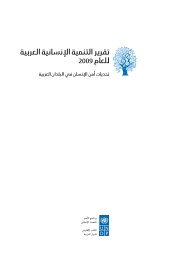arab human development report 2003 - Palestine Remembered
arab human development report 2003 - Palestine Remembered
arab human development report 2003 - Palestine Remembered
- No tags were found...
You also want an ePaper? Increase the reach of your titles
YUMPU automatically turns print PDFs into web optimized ePapers that Google loves.
Arab countries, onaverage, continued toevince the lowestlevels of freedomamong the worldregions compared.DEVELOPMENTS IN FREEDOMAND GOOD GOVERNANCE ASREFLECTED IN INTERNATIONALDATABASESThis section is based on freedom and goodgovernance indicators as accessed through internationaldatabases. 12 The authors recognisethe disadvantages of relying on such internationalsources, yet are obliged to turn to themfor lack of better alternatives from the regionon this crucial dimension of <strong>human</strong> <strong>development</strong>.It is to be hoped that such Arabic alternativeswill develop in the future, possiblyinspired by this series of Arab HumanDevelopment Reports.LEVEL OF CIVIL AND POLITICALLIBERTIES (1990-2000)The first AHDR (2002) measured freedom byusing values of the indicator developed byFreedom House, which at that time stopped at1998. At the time of writing this <strong>report</strong>, the indicatorwas available only up to 2000/2001(Freedom House, 2002). It should be notedthat freedom scores, as developed by FreedomFigure 5Freedom scores, weighted by population size:the Arab region and other world regions, 1990-2000 (average values)House, are far from perfect measures and mayreflect certain biases inherent in their source.Yet they constitute the only database currentlyavailable for measuring essential freedomsover time.Figure 5 shows that while the generaltrend saw freedom rise worldwide, in mostArab countries it fell, with an apparent declineduring the early 1990s. Arab countries, on average,continued to evince the lowest levels offreedom among the world regions compared.In fact, according to this indicator, fiveArab countries were among the ten least freecountries in the world during 2000/2001.INDICATORS OF VOICE ANDACCOUNTABILITYInternational databases also provide indicatorsof voice and accountability (Kaufmann etal., 2002), which are among the essential requirementsof good governance and which thefirst AHDR used to illuminate its case. Figure6 illustrates that, despite a slight improvementin Arab countries between the two years considered,when it comes to voice and accountability,the Arab region still ranks lowest in theworld.PERCEPTIONS OF CORRUPTION INBUSINESS TRANSACTIONSFigure 7 presents the latest evaluations of perceptionsof corruption in business transactionsworldwide according to TransparencyInternational (2002). The lowest values of thisindicator are the worst (i.e., the most corrupt).The figure does not indicate a noticeableimprovement in the position of Arab countriesin comparison to other world regionsevaluated between the years 1998 and 2002.However, the position of one country, Egypt,improved slightly.EVENTS INFLUENCING HUMANDEVELOPMENT IN ARABCOUNTRIESThis section documents important events influencingArab <strong>human</strong> <strong>development</strong> on the12Specifically, the ‘Freedom Score’ published by the US-based "Freedom House". For technical and practical reasons, the first Report made use of thisindicator, despite some important reservations. These reasons include a long time series and a detailed database on various political and civil freedoms.In the absence of other comp<strong>arab</strong>le sources, the score is maintained here.28 ARAB HUMAN DEVELOPMENT REPORT <strong>2003</strong>







